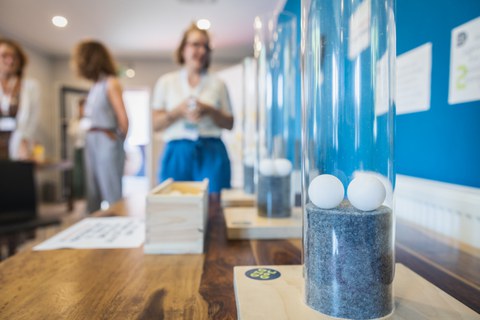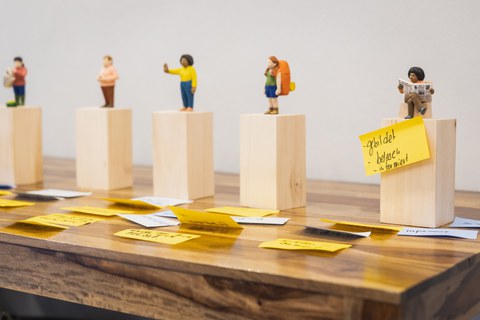JoDDiD circuit training
To strengthen political didactic thinking and action muscles
Table of contents
Why political didactics circuit training?
Political education and encounters with a wide variety of people often lead to inspiring and exciting discussions. However, questions about one's own role and attitude, about what can be exciting for the participants or how offers can be designed in a methodologically appealing and innovative way, arise again and again during the conception phase.
The John Dewey Research Center's circle training aims to address these questions in order to strengthen the didactic muscles of reflection, attitude and conflict.
From self-reflection and positioning to perspective-taking and negotiation, a wide range of JoDDiD materials are tested in the circle training in combination with methods of political education in order to train one's own didactic thinking and acting muscles.
Participants can exchange views on core issues of political education or reflect together on approaches, goals, concepts or methods with regard to their educational work. They get to know JoDDiD materials in practice and try out their use. This makes it easy to integrate them into your own formats and offers.
What are the benefits of circuit training for my civic education programs?
Low-threshold, activating and participation-oriented approaches to socio-political issues.
Position lines, voting or pro-con debates - popular, basic methods of political education that can reflect a variety of convictions or train discourse skills. But what exactly do these methods strengthen? What different social and political issues can be negotiated using different methods? How can methods that sometimes seem somewhat outdated be (re)conceived in a learner-oriented way? These questions are the starting points of the circle training. Joint reflection on one's own practice is always a central component. We are aware that there are many different needs for circuit training. Therefore, there will be a discussion for every request in which we jointly identify the content and relevant questions of the circuit training and adapt it to the specific needs.
Material without circuit training - is that possible?
All JoDDiD circuit training materials can also be used without the circuit training and applied in your own formats. Depending on the material, you can download it directly, order it in the store or request to borrow it.
Our experience shows that testing and reflecting on methods and materials together strengthens didactic skills. We at JoDDiD want to take this insight into account by offering the circle training for political educators to support them in the (further) development of their offers. The circle training is free of charge like all JoDDiD offers - if you are interested, just write to us:
Which muscles of thought and action are strengthened by the circuit training?
Continuous reflection on your own ideas and assumptions not only strengthens your own attitude. It helps in dealing with criticism and feedback and strengthens tolerance of ambiguity. Reflection helps to be open to new impulses and to question one's own actions from various perspectives, regardless of whether the impulses come from outside or from within. Self-reflection and group reflection can also be used as approaches to various political topics. In the JoDDiD circle training, this muscle is trained using various materials:
- The "political education logbook" invites self-reflection with various prompts.
- The giant worksheets can be used as occasions for self- and group reflection as an introduction to educational formats.
- The trap quartet helps to raise awareness of possible stumbling blocks in political education.
- The wooden citizens invite reflection on the goals and guiding principles of political education processes.
- The conversation cards, which offer question-led discussion and reflection opportunities on various topics.
It is important for political judgment and action competence to be able to formulate and represent one's own attitudes, interests and convictions appropriately. But how can you identify your own stance in the first place? And how can the formulation of individual convictions be practiced and strengthened in a group?
In the circle training, basic methods of political education are used to test how one's own stance can be identified and made visible. We use materials developed by JoDDiD that show new perspectives on familiar methods.
- The voting devices to show interests, opinions or approaches.
- The position carpets for methods such as the position line or the pro-con debate.
- The giant worksheet on the tolerance limit.
Political capacity to act is challenged above all in crises, in which various emotions tend to give us a feeling of action-taking capacity. It is therefore important to train this muscle with a view to dealing with conflicts and problems so that action-taking capacity can be regained. In JoDDiD circuit training, these muscles are trained using the following materials and methods as examples:
- The thinking hats, which can support perspective-taking.
- The giant worksheets, which can be used to implement complex methods such as the future workshop.
- The voting devices or the carpets can also be used here.


